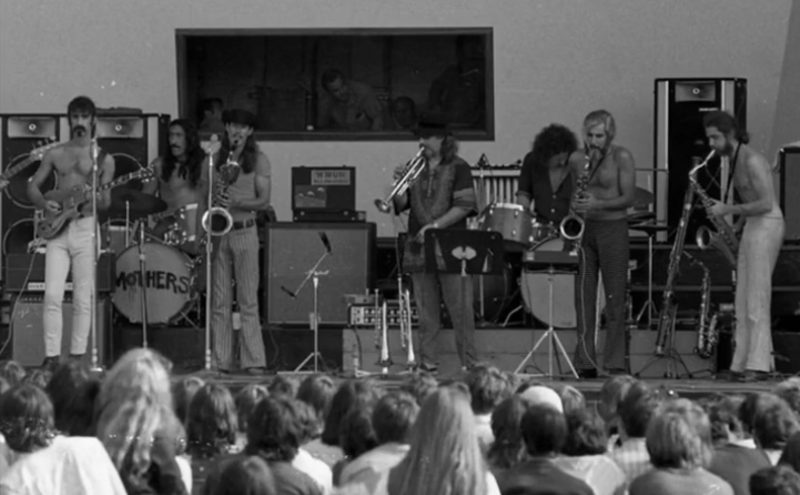I am a pensioner!" Roger Daltrey declares with a laugh. "I'm not just a few years from it. Technically, I am. That's the age we are."
Do the math. Circa 1965, Daltrey was the 21-year-old lead singer of a U.K. band called the Who – a flinty young tough with a forceful vocal style who wore his working-class background on the bones of his knuckles. A few years later, he transformed into a golden-maned, bare-chested sex symbol, albeit one who could still kick the ass of any heavy-lidded hippie foolish enough to think the mellow Woodstock ideal held the slightest appeal for him. (Plenty of fellow Woodstock participants spent much of this year waxing nostalgic about the fest's fortieth anniversary — but not Daltrey.) And in subsequent decades, he's gone in and out of style nearly as often as "Who Are You" has been heard in the credits of CSI.
As of today, Daltrey's spent more than 65 years on the planet — a benchmark that's even more noteworthy given the fact that he famously sang "I hope I die before I get old" in the early Who classic "My Generation." Some performers would view this distinction as an artistic albatross, especially considering what's happened to the Who since he first spat out those words: With drummer Keith Moon and bassist John Entwistle forming one of eternity's greatest rhythm sections, Daltrey and Pete Townshend, also 65, are the last bandmembers still drawing breath. Ask him if he sees any irony in the line these days, however, and his response is unequivocal.
"None whatsoever," he says. "When I look at that group...what were they called? The Zimmers? All those 85-year-olds who sang 'My Generation'? When they sing it, the song's got a totally different meaning. That's not ironic. It's wonderful. It's truly wonderful seeing those old people sing that song. They're talking about their generation. I think that's fucking great. And long may they do so!"
Daltrey applies the same just-keep-doing-it philosophy to his own career. With no Who tour on the docket at present, he's grown restless — so much so that he's taking part in his first solo jaunt in 24 years. He hopes the gigs will exercise his voice in ways that practicing can't. "I do sing a bit" when not on the road, he says, "but it isn't like being out there, doing it every night. It's like being a boxer. You can train and you can do all those things, but to get ring-fit, you need to fight."
Getting his pipes ready is important given word that Townshend is in the midst of writing a new rock opera titled Floss. According to Townshend's description on the Who's website, the storyline revolves around a pub-rock musician who hits it big. But don't come to Daltrey looking for more details. "I'll hear it when he calls up and says, 'Can you be in the studio next week?'" he notes, laughing. Indeed, Townshend seldom provides him with previews — but neither does Daltrey allow the tunesmith to dictate his approach. "When he gives me a song he's written, he never knows what he's going to get back from my performance of it," he points out. "Obviously, if he's venomous about something he doesn't like, we'll talk about it. But up until now, it's worked. He's been on record as saying, 'I didn't like some of the things he did.' But the public, by the way they've accepted the songs, seems to have shown that maybe I was right."
Likewise, Daltrey doesn't get self-conscious when he's put in the position of singing in character, as he'll be required to do with the Floss material. "All I know is, I try to inhabit the song and make it live. I'm basically a troubadour. I'm a storyteller. And every song has a story, especially the way Pete writes, and I try to inhabit the center of that song, from the center of myself. If that is me, then that's what it is.... I know when I'm nailing the truth of a song."
He should have a leg up when it comes to Floss, which, in Townshend's words, will "take on aging and mortality, using the powerfully angry context of rock 'n' roll." Daltrey admits to thinking about these subjects, but, he says, "I don't worry about them." Even so, "It's always frustrated me that rock and roll has always been stuck in writing about youth things, and it shouldn't be. It's a musical vehicle for expression, and expression doesn't only sit with those teenage years. Old people have got more to say, I think, and it's frustrated me that rock's never been there. Pete Townshend is one of the few people who can write articulately about adult subjects, and middle age and old age subjects within a rock-and-roll framework, and, well, maybe that's where he's at now. I still believe that it's very necessary, and if anyone can do it, he can."
Too bad there aren't more filmmakers with the same skill set. Following his acclaimed performance in the title role of Tommy, the 1975 adaptation of Townshend's first rock opera, Daltrey has acted on a fairly regular basis in films and TV series. But in recent years, the roles have dried up, leaving him to take parts like Argon the Dragon Bus Driver in the kids' DVD The Wheels on the Bus: Mango and Papaya's Animal Adventure. "There's so few films being made these days, especially for older actors," he maintains. "I've had a few things offered, but there's not been anything good for a long time."
Developing his own material has been just as difficult. For instance, he's tried to get a biography of Keith Moon off the ground for years, but comedian Mike Myers, who's talked about starring in the part, is getting pretty long in the buck teeth to pull it off (and may have been since the beginning). Moreover, "I can't get a script that works," Daltrey says. After rejecting "ten or eleven" different versions, "I've kind of reined it in right now, because I'm into other things. But one day I'll get it done. It's probably a script I have to write, and I'm a bit insecure about that. But maybe someday."
He had more success with a recent campaign to increase copyright protection for performance royalties in England. The government there recently boosted the time period from fifty to seventy years, which means Daltrey will continue earning a few tuppence from Who albums until he's a nonagenarian, as opposed to losing the income by the middle of the next decade. "For people like me, who've done very well out of the business, it wouldn't mean that much," he concedes. "But the average musician is someone who perhaps earns a few thousand dollars a year, and it's the difference between him having a reasonable lifestyle and being on the policy line."
This fate won't befall Daltrey, especially since a new album is in the offing: Townshend would like to make the next Who long-player available next year, possibly featuring some Floss material as a preview of the project's full-scale staging in 2011. Of course, even some fans wonder about the continuing use of the band's name a full seven years after Entwistle's death. But Daltrey sees such a debate as pointless.
"That's their problem," he says. "I have no comment on that." Seconds later, though, he comes up with one. In his view, "They're the ones who truly are old."
Visit blogs.westword.com/backbeat/ for more of our interview with Roger Daltrey.












